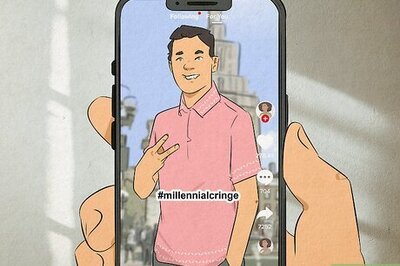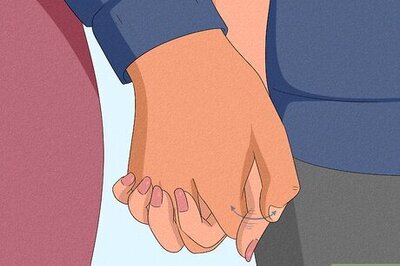
views
Negative Emotional Character Traits
These traits concern different emotional aspects of a character—their temperament, the way they experience emotions, and how they manage their emotions. Keep in mind that “negative” is a relative concept—some of these traits might be negative to some people, but neutral or not so bad to others. Anxious - Extremely uneasy or fearful about what might happen Crabby - Irritable, easily annoyed, given to complaining Cynical - Distrusting of people and their motivations Dramatic - Theatrical, reacts in exaggerated ways Excitable - Easily excited or roused into action Fearful - Prone to getting scared often Frenetic - Energetic in a wild, uncontrolled manner Grim - Forbidding, uninviting, or lacking levity Grumpy - Bad-tempered Hysterical - Affected by hysteria (uncontrolled, extreme emotions) Insecure - Lacking confidence and self-assurance Irritable - Easily annoyed or angry Jealous - Envious of other people and their achievements Jittery - Nervous, unable to relax Maudlin - Self-pitying, overly sentimental Melancholic - Filled with pensive sadness, severely depressed Melodramatic - Prone to exaggerated or overemotional reactions Moody - Prone to unpredictable mood changes Morose - Sullen, gloomy, bad-tempered Nervous - Easily alarmed or agitated, high-strung Nihilistic - Having the viewpoint that life is meaningless Overemotional - Unusually and excessively emotional, easily excited Overwhelmed - Defeated, completely overcome in mind or feeling Paranoid - Unreasonably anxious and suspicious of people Pessimistic - Tending to see the worst in people or believe the worst will happen Smug - Showing excessive pride in oneself Temperamental - Prone to unreasonable mood changes Tense - Rigid, unable to relax, prone to nervousness or anxiety Thin-skinned - Sensitive to criticism and insults Tremulous - Timid and nervous Meet the wikiHow Experts Tara Blau Smollen is a Presentation & Acting Skills Coach with over 35 years of professional and academic experience. Tara is a three-time Bay Area Theatre Critics Circle (BATCC) Award Nominee and a two-time Dean Good Award Recipient. Grant Faulkner, MA is a professional writer and the Executive Director of National Novel Writing Month (NaNoWriMo). Grant is also the co-founder of the literary magazine 100 Word Story and has published two books on writing.
Negative Social Character Traits
Social traits affect how characters interact with others (and the environment around them). Communication skills, social awareness, and the ability to form relationships all fall under this umbrella, and there are negative character traits that can affect each of those skills. Take a look at the following negative social character traits: Abrasive - Unconcerned with other people’s feelings Antisocial - Shunning the company of others Arrogant - Having an exaggerated sense of one’s importance Bad-mannered - Having poor manners, impolite Blunt - Uncompromisingly forthright and plainspoken Boastful - Showing excessive pride and self-satisfaction in one’s achievements Callous - Cruel and insensitive, showing disregard for others Conceited - Vain, excessively proud of oneself Confrontational - Argumentative, tending to deal with situations in an aggressive manner Controlling - Inclined to control situations or other people’s behavior Defamatory - Making harmful and untrue statements about others to damage their reputation Dishonest - Prone to untrustworthy or fraudulent behavior Disloyal - False or treacherous toward others Disrespectful - Showing a lack of respect or courtesy toward others Garrulous - Excessively talkative, usually on trivial subjects Gossipy - Enjoys talking, gossiping, and spreading rumors about other people Harsh - Cruel, severe Haughty - Arrogantly superior and disdainful of others Inconsiderate - Prone to thoughtlessness and acting without consideration of others Insensitive - Shows no concern for other people’s feelings or pain Insolent - Intentionally rude or disrespectful toward others Intrusive - Intruding where one is not welcome, making others uncomfortable Judgmental - Tends to make quick, overly harsh, or critical judgments Manipulative - Controls people to one’s own advantage Mocking - Making fun of others in a cruel way Nagging - Persistently complaining or criticizing others Nosy - Prone to prying into other people’s affairs Offensive - Unpleasant, aggressive, causing others to feel hurt or angry Overbearing - Domineering and oppressive; bossy Passive-aggressive - Prone to expressing negative feelings indirectly (through the silent treatment, sarcasm, and so on) instead of addressing them openly Patronizing - Showing a superior attitude, speaking like others are unimportant Perfidious - Untrustworthy, treacherous, and deceitful Quarrelsome - Prone to arguing or fighting with others Rude - Offensive, impolite, bad-mannered, or crude Snide - Derogatory or mocking toward others Snobby - Treating others as lesser and acting superior (often based on class or wealth) Stern - Serious, strict, severe, and unrelenting in disposition Stubborn - Unwilling to yield, refusing to consider new ideas or ways of doing things Tactless - Lacking sensitivity when dealing with others (and delicate issues) Timid - Easily scared; lacking courage or confidence Uncommunicative - Unwilling to talk or give information to others Uncooperative - Unwilling to help or work with people when asked Verbose - Uses more words than necessary, often rambling and causing boredom Vulgar - Lacking sophistication, making offensive or rude comments Whiny - Prone to complaining, particularly with an annoying, high-pitched voice
Negative Behavioral Character Traits
Behavioral traits reflect a character’s patterns of behavior—in other words, the way they act around others. This is a pretty broad category, as people can act in many different ways! Once again, some of the behavioral character traits below might be considered more severe or negative than others, depending on your outlook and opinion. Addictive - Predisposed to addiction (unhealthy dependence) on substances or habits Aggressive - Forceful, prone to making unprovoked attacks or arguments Antagonistic - Showing unfriendliness or opposition to someone Avoidant - Prone to withdrawing from intimacy or interactions with others Bawdy - Indecent and lewd, making boisterous and obscene sexual jokes Belligerent - Inclined to be combative or aggressive toward others Blundering - Prone to foolish or careless mistakes Boorish - Rough, rude, or insensitive to other people’s feelings Brash - Assertive or irreverent in a rude, noisy manner Brutish - Prone to rough, unpleasant, or violent behavior Cantankerous - Bad-tempered and argumentative Catty - Purposefully spiteful and unkind to others Childish - Behaving in a childlike, immature manner Cocky - Conceited and arrogant; smugly self-confident Cold - Lacking affection or emotion Compulsive - Unable to stop oneself from doing something Crass - Lacking refinement or sensitivity Defensive - Having a self-protective attitude, anxious to challenge and deflect criticism Devious - Using dishonest methods to achieve goals; lying to or tricking others Disorganized - Lacking coordination, having difficulty staying organized, and performing tasks Evasive - Prone to avoiding commitment or connection with others Extravagant - Lacking restraint in terms of spending money or indulging one’s desires Foolish - Lacking good judgment or wisdom Frivolous - Lacking serious purpose, overly carefree Fussy - Hard to please, being picky about one’s needs and requirements Gluttonous - Excessively greedy, eating or drinking without restraint, and consuming more than needed to an unhealthy degree Greedy - Having an intense, selfish desire for something (often money or power) Gutless - Lacking courage Hypocritical - Behaving contrary to one’s beliefs (or what one claims to feel) Immature - Childish, showing emotional or intellectual depth suitable for someone younger Impatient - Easily irritated or provoked, unwilling to accept delays Impractical - Not sensible, practical, or realistic Impulsive - Acting without thinking or considering the consequences first Inflexible - Unwilling to change or accept a compromise Inhibited - Unable to relax or act naturally, held back by mental restraint Irresponsible - Lacking a sense of responsibility, not reliable or trustworthy Lascivious - Filled with overt, often offensive sexual desire Lecherous - Showing excessive sexual desire (and acting on it in a way that makes others uncomfortable) Lewd - Crude, offensive, prone to making vulgar sexual remarks Loutish - Behaving in a way that’s rude, awkward, clumsy, or aggressive; prone to bad behavior and manners Macho - Having aggressive and excessive pride in one’s masculinity Meek - Submissive, willing to go along with whatever other people want Mischievous - Fond of causing mild trouble, annoying people, playing pranks Needy - Desperate for attention and love, overly clingy Obsessive - Prone to thinking about someone or something all the time, nonstop Perfectionism - Refusing to accept any standard short of perfection Possessive - Determined to own or control someone or something; demanding someone’s complete attention Pretentious - Trying to seem smarter or more important than one really is Prideful - Having an overly high opinion of oneself Pushy - Trying too hard or aggressively to get someone to do something Reckless - Prone to acting without thinking about the consequences Resentful - Feeling bitter or indignant toward others, often about something unfair Restless - Unable to rest or relax Rowdy - Noisy, boisterous, and disorderly Self-indulgent - Doing precisely what one wants, following one’s appetites, desires, and whims without restraint Selfish - Concerned with oneself alone, and lacking consideration for others Shallow - Lacking character and emotional or intellectual depth Shifty - Deceitful, evasive, and untrustworthy Spoiled - Being demanding and entitled after having been treated indulgently by others Stingy - Lacking generosity, unwilling to give or spend money Subservient - Willing to obey orders or do what others want without question Superstitious - Believing in superstitions (old ideas about magic and luck) Suspicious - Distrustful of someone or something Uncouth - Lacking grace or polish, behaving rudely Ungrateful - Showing or feeling no gratitude toward others Unscrupulous - Having no moral standards; lacking principles Vain - Having an overly high opinion of oneself, taking excessive pride in appearances Vindictive - Having a strong, spiteful urge to seek revenge Volatile - Likely to change unpredictably (usually for the worse) Withdrawn - Unwilling to communicate with others Workaholic - Working hard nearly all of the time, finding it hard to stop working Zealous - Showing ardent, intense devotion to a particular belief or cause
Negative Cognitive & Motivational Character Traits
Cognitive and motivational traits refer to a character’s mental processes, thinking abilities, and drive to get things done or accomplish their goals. There are negatives at both ends of the spectrum for this category; for instance, a character might have no motivation to achieve something or pursue it with such single-minded determination that they forget everything else. Take a look: Aimless - Having no purpose or direction in life Apathetic - Showing no interest or emotion; being unwilling to take action Banal - Lacking originality or uniqueness; boring Clueless - Having no knowledge of something; being totally uninformed Complacent - Being so satisfied with a situation that one feels no need to try harder Dim - Not bright; lacking intelligence or knowledge Dysfunctional - Not functioning or behaving in a way that others would consider normal Flaky - Unreliable and prone to irresponsibility; eccentric and unconventional Forgetful - Unlikely to remember things; neglectful Gullible - Easily fooled, duped, or persuaded to believe things Humorless - Lacking a sense of humor, unlikely to laugh or express humor Idle - Lazy and prone to doing nothing; prone to avoiding work Indecisive - Unable to make effective decisions Ignorant - Lacking knowledge, awareness, or education Inattentive - Not attentive; not paying attention to others Irrational - Lacking logic or reason, prone to acting without clear thinking Know-it-all - Behaving as if one knows everything Lazy - Being unwilling to work or exert any energy Morbid - Interested in disturbing and unpleasant subjects Mundane - Lacking interest or excitement Oblivious - Unaware of things happening around oneself; lacking mindful attention Procrastinating - Prone to delaying or postponing something as long as possible Scatterbrained - Disorganized, lacking concentration or focus Single-minded - Concentrating on one single goal or purpose Sluggish - Lacking energy, slow-moving, inactive Unimaginative - Lacking imagination, creativity, or cleverness Unintelligent - Lacking intelligence or knowledge Uninteresting - Incapable of attracting interest from others Weak-willed - Lacking the ability to restrain oneself or resist outside influences
Extremely Negative Character Traits
The negative traits below don’t fit into a particular emotional, behavioral, or social category. Instead, they’re some of the more extreme negative characteristics, including many that a true villain character might have (as opposed to run-of-the-mill flaws that any character could possess). Here’s a list of intensely negative traits: Abhorrent - Inspiring intense disgust or hatred from others Abusive - Offensive, insulting, regularly using cruelty or violence against others Amoral - Lacking morality and unconcerned with “right” or “wrong” Authoritarian - Enforcing strict obedience and authority over others Barbarous - Savagely cruel and brutal; uncivilized Bigoted - Devoted to a creed or opinion that makes them intolerant toward others Brutal - Lacking sensitivity or compassion; savage or violent Bully - Pushing people around, using words or violence to hurt others Cruel - Willfully hurting others and causing suffering without regret Cowardly - Lacking courage, unwilling to take risks, unprincipled Destructive - Causing immense harm or damage (to people or things) Dogmatic - Prone to expressing faith or beliefs strongly and treating them like facts Egocentric - Thinking only of oneself without considering the needs of others Evil - Given to profoundly immoral behavior, causing pain and suffering in others Extremist - Someone with extreme, unreasonable political or religious views Fanatical - Motivated by extreme devotion to a single (controversial) matter Fiendish - Diabolical, perverse, taking devilish pleasure in hurting people Hateful - Full of hate and malice Hostile - Openly antagonistic, unfriendly, and aggressive toward others Intolerant - Unwilling to accept beliefs or behavior that are different from one’s own Malevolent - Having the desire to cause great harm or evil to others Malicious - Filled with the desire to cause harm or suffering to others Maniacal - Prone to wild, violent, erratic behavior Merciless - Having no mercy for others, unrelenting, pitiless Prejudiced - Having an unreasonable dislike or distrust for someone due to a bias Racist - The belief that one’s race makes one better than other people Remorseless - Having no regret or guilt, often about cruelty toward others Revolting - Extremely unpleasant, disgusting, or offensive to be around Ruthless - Having no pity or compassion for others Sadistic - Taking pleasure or satisfaction from inflicting pain and humiliation on others Self-destructive - Prone to behavior that could harm or destroy oneself Unethical - Not conforming to a morally correct or ethical standard Vicious - Deliberately cruel, harsh, and severe Violent - Prone to using violent, destructive physical force against others Wicked - Evil, morally wrong, sinful Xenophobic - Feeling fear and hatred toward anyone considered “foreign” or strange
How to Use Negative Character Traits in Writing
Create flawed and relatable characters. Everyone has flaws and negative traits; it’s part of being human. And, as Blau Smollen says, “The most compelling people or villains are the ones that are not just two-sided but have a lot of layers to them, like an onion.” So, give your characters (including the protagonist) realistic flaws to make them more relatable to readers. When readers can identify with a character and their flaws, it makes the whole story more entertaining! For example, you could have a protagonist who struggles with insecurity or anxiety, which are both things that many people deal with in real life, too.
Use negative traits to drive a character or story’s conflict. “I think the most important thing about a character in the novel is for the author to know what drives that character, what motivates them, what the character's desire is, and what stands in the way of the character achieving that desire,” says Faulkner. See if you can find flaws by fleshing out a character’s motivations; you can then use those flaws to create internal and external conflict throughout the story. Internal conflict occurs within the character’s mind; for example, a resentful character might struggle internally with overcoming their bitterness and learning to forgive. External conflict occurs between characters and outside forces; for example, a flaky or jealous character might hurt the protagonist, causing a rift between them that gets resolved by the end of the story.
Foreshadow a character’s future arc with their negative traits. As we’ve already mentioned, negative traits don’t have to stay exactly as they are; a character can grow and learn from them. So, when you define a character’s most significant flaws at the beginning of a story, it also reveals to readers what those characters will have to overcome to grow (or what their ultimate downfall will be). For example, a hero who overthinks everything might need to manage those anxieties to finally succeed. On the other hand, a cowardly character might end up losing to the protagonist or receiving their just reward due to their cowardice.
Make realistic villains with negative traits. A truly great villain shouldn’t be evil just because. “Think about writing an autobiography of the character, and think about what has made them come to this,” Blau Smollen recommends. “Are they as horrible as we think they are?” In other words, give your villains a real reason to do the things they do, and characteristics that influence their actions, making them the villains they are. For example, your villain could be authoritarian and destructive because they fear it’s the only way to protect the things they love most.
Examples of Literary Characters with Notable Flaws
Just in case you need some real-life examples of negative traits in characters, we’ve come prepared! Keep in mind that the characters on this list aren’t all “evil” or “villains”; the point here is to show you that negative character traits can apply to all characters in different ways. From protagonists to the most malicious of villains, negative traits are everywhere, so take a look: Bilbo Baggins (The Hobbit) - Bilbo begins the story being complacent and rather aimless; as the protagonist, he becomes more heroic (and a better burglar) during his journey. Ebeneezer Scrooge (A Christmas Carol) - Ebeneezer is despised for his greed, selfishness, and stinginess at the beginning of the story; after he is shown the consequences of his actions, he becomes more generous and kind. Victor Frankenstein (Frankenstein) - He becomes blinded by his arrogance and selfishness before later coming to regret his actions. Hamlet (Hamlet) - Hamlet becomes paralyzed by overthinking and allows resentment to rule his actions. Patrick Bateman (American Psycho) - Patrick is violent and sadistic, while also suffering from intense insecurity. Severus Snape (Harry Potter) - Snape is bitter, spiteful, and a bully toward many of his students, despite working for the “good guys” all along.



















Comments
0 comment